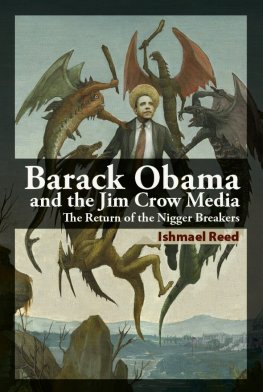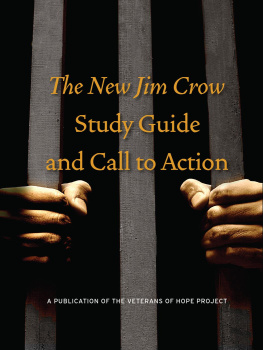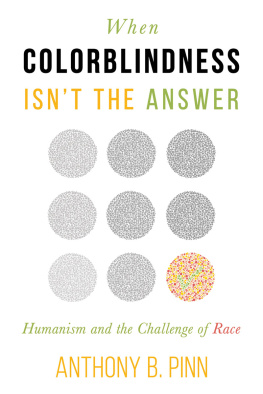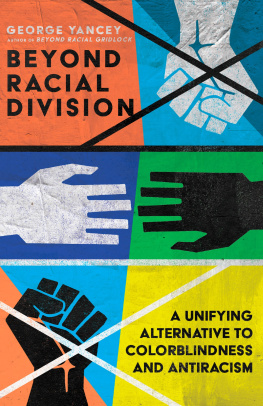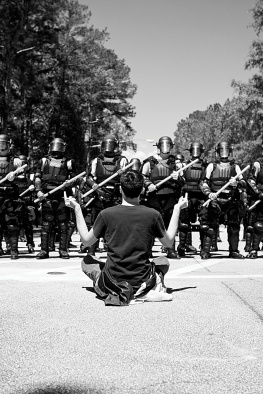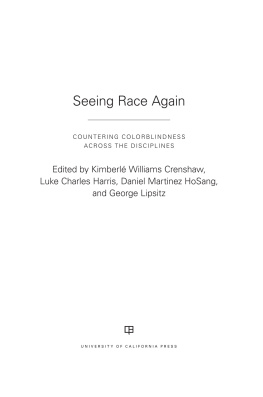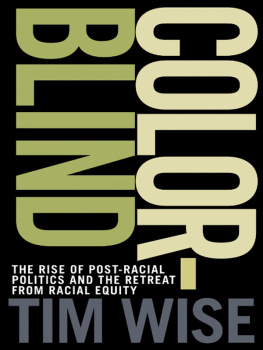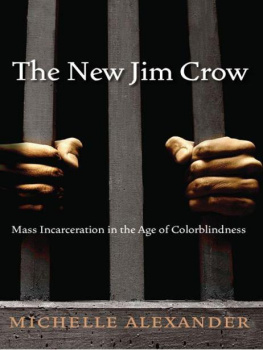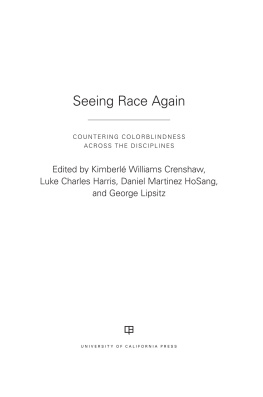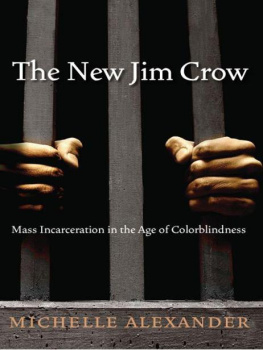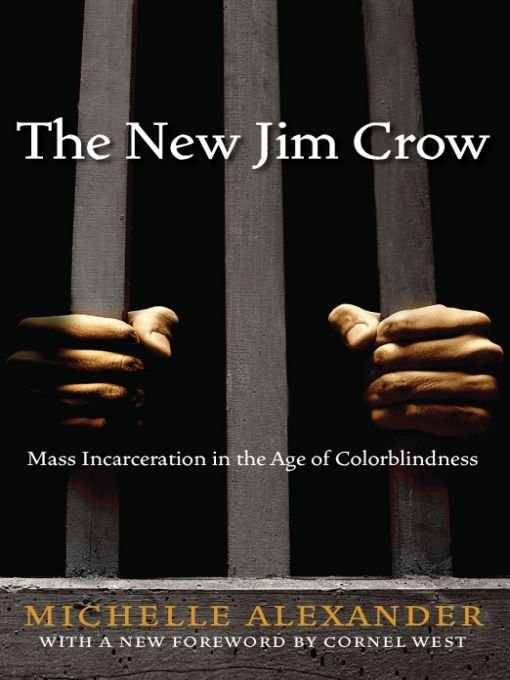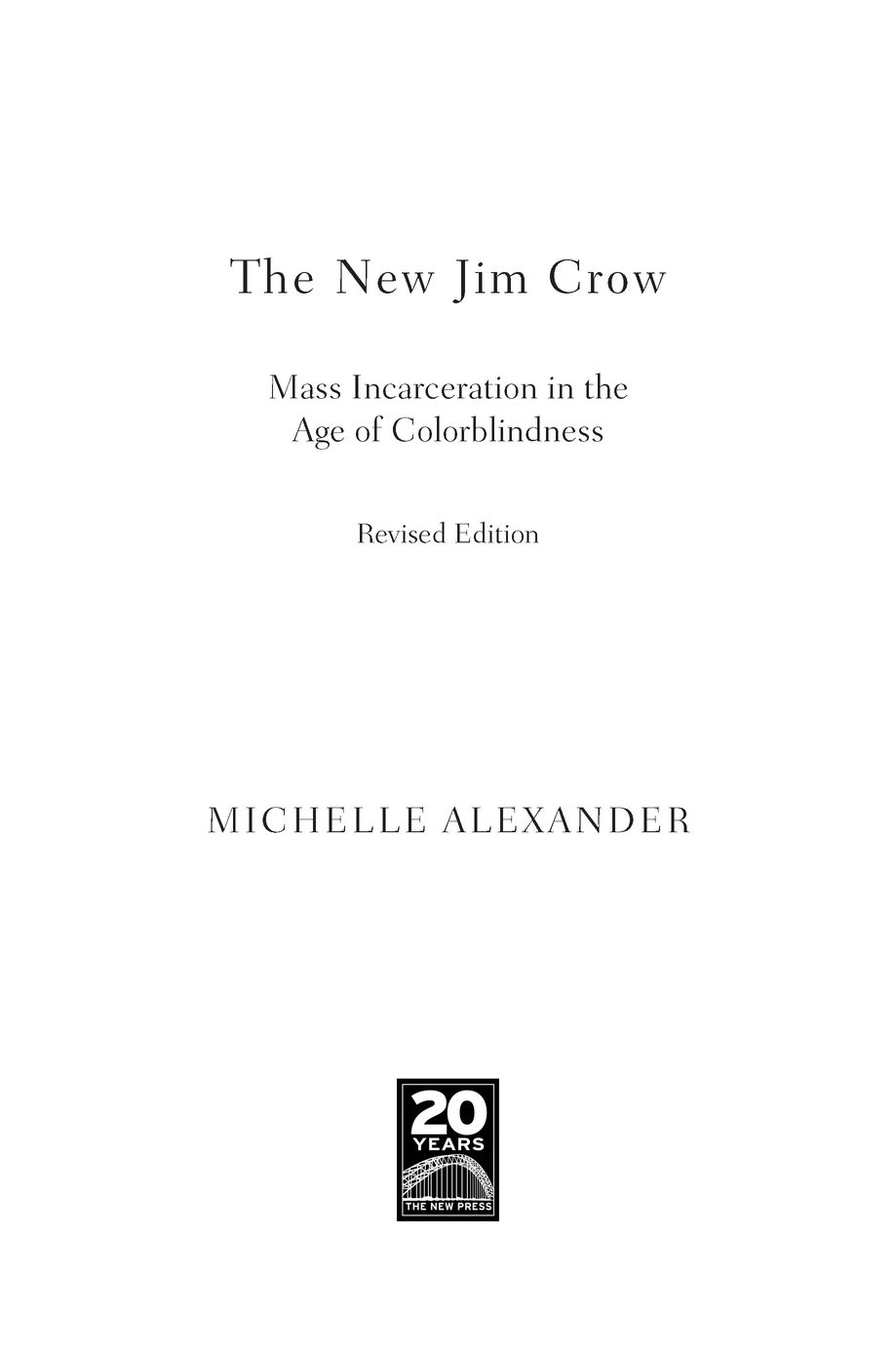Table of Contents
Praise forThe New Jim Crow
An instant classic.
Cornel West, from the foreword to the paperback edition
[An] extraordinary book.... Michelle Alexander has placed a critical spotlight on a reality our nation cant afford to deny. We ignore her careful research and stay silent about mass incarcerations devastating effects at our own and our nations peril.
Marian Wright Edelman
Striking.... Alexander deserves to be compared to Du Bois in her ability to distill and lay out as mighty human drama a complex argument and history.
Darryl Pinckney,The New York Review of Books
The Bible of a social movement.
San Francisco Chronicle
A devastating account of a legal system doing its job perfectly well. Alexander looks in detail at what economists usually miss, namely the entire legal structure [and]... does a fine job of truth-telling, pointing a finger where it rightly should be pointed: at all of us, liberal and conservative, white and black.
Forbes
Alexander is absolutely right to fight for what she describes as a much needed conversation about the wide-ranging social costs and divisive racial impact of our criminal-justice policies.
Ellis Cose,Newsweek
Invaluable... a timely and stunning guide to the labyrinth of propaganda, discrimination, and racist policies masquerading under other names that comprises what we call justice in America.
Daily Kos
A troubling and profoundly necessary book.
The Miami Herald
[An] important book.
The Baltimore Sun
A stunning debut.
Journal of Blacks in Higher Education
Many critics have cast doubt on the proclamations of racisms erasure in the Obama era, but few have presented a case as powerful as Alexanders.
In These Times
[Written] with rare clarity, depth, and candor.
Counterpunch
A call to action for everyone concerned with racial justice and an important tool for anyone concerned with understanding and dismantling this oppressive system.
Sojourners
Undoubtedly the most important book published in this century about the U.S.
Birmingham News
[A] searing indictment of the War on Drugs.... If you care even a little about racial justice, The New Jim Crow should be on your bookshelf. It is the most important book you will read this year.
Seattle Post-Intelligencer
A well-researched book.
Clarence Page,Chicago, Tribune
Carefully researched, deeply engaging, and thoroughly readable.
Publishers Weekly(starred review)
An explosive debut.
Kirkus Reviews
[Alexanders] analysis reflects the passion of an advocate and the intellect of a scholar.
Marc Mauer, executive director of The Sentencing Project and the author ofRace to Incarcerate
Michelle Alexander argues convincingly that the huge racial disparity of punishment in America is not the mere result of neutral state action. She sees the rise of mass incarceration as opening up a new front in the historic struggle for racial justice. And shes right. If you care about justice in America, you need to read this book!
Glenn C. Loury, professor of economics at Brown University and author ofRace, Incarceration, and American Values
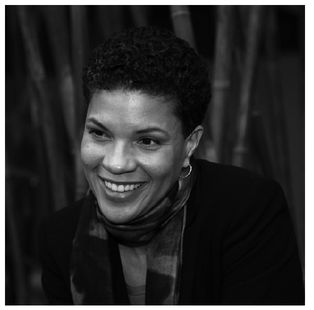
Michelle Alexander is a highly acclaimed civil rights lawyer, advocate, and legal scholar. As an associate professor of law at Stanford Law School, she directed the Civil Rights Clinic and pursued a research agenda focused on the intersection of race and criminal justice. In 2005, Alexander won a Soros Justice Fellowship that supported the writing of The New Jim Crow and accepted a joint appointment at the Kirwan Institute for the Study of Race and Ethnicity and the Moritz College of Law at The Ohio State University, where she currently serves as an associate professor of law. Prior to joining academia, Alexander engaged in civil rights litigation in both the private and nonprofit sector, ultimately serving as the director of the Racial Justice Project for the ACLU of Northern California, where she helped to launch a national campaign against racial profiling. Currently she devotes much of her time to freelance writing, public speaking, supporting groups and organizations engaged in movement-building to end mass incarceration, and caring for her three young children.
Alexander is a graduate of Stanford Law School and Vanderbilt University. She has clerked for Justice Harry A. Blackmun on the U.S. Supreme Court and for Chief Judge Abner Mikva on the D.C. Circuit of the U.S. Court of Appeals, and has appeared as a commentator on CNN and MSNBC, among other media outlets. The New Jim Crow is her first book. For more information, visit www.newjimcrow.com. (Photo courtesy of Zcalo Public Square, zocalopublicsquare.org.)
For Nicole, Jonathan, and Corinne
Foreword
CORNEL WEST
Michelle Alexanders The New Jim Crow is the secular bible for a new social movement in early twenty-first-century America. Like C. Vann Woodwards The Strange Career of Jim Crowa book Martin Luther King Jr. called the historical bible of the Civil Rights Movementwe are witnessing the unique union of a powerful and poignant text with a democratic awakening focused on the poor and vulnerable in American society. The New Jim Crow is an instant classic because it captures the emerging spirit of our age. For too long, there has been no mass fight back against the multileveled assault on poor and vulnerable people, despite the heroic work of intellectual freedom fighters including Marian Wright Edelman, Angela Davis, Loc Wacquant, Glenn Loury, Marc Mauer, and others. Yet the sleepwalking is slowly but surely coming to a close as more and more fellow citizens realize that the iron cage they inhabitmaybe even a golden cage for the affluentis still a form of bondage. The New Jim Crow is a grand wake-up call in the midst of a long slumber of indifference to the poor and vulnerable. This indifference promotes a superficial ethic of successmoney, fame, and pleasurethat leaves too many well-adjusted to injustice. In short, this book is a genuine resurrection of the spirit of Martin Luther King Jr. amid the confusion of the Age of Obama.
While the Age of Obama is a time of historic breakthroughs at the level of racial symbols and political surfaces, Michelle Alexanders magisterial work takes us beyond these breakthroughs to the systemic breakdown of black and poor communities devastated by mass unemployment, social neglect, economic abandonment, and intense police surveillance. Her subtle analysis shifts our attention from the racial symbol of Americas achievement to the actual substance of Americas shame: the massive use of state power to incarcerate hundreds of thousands of precious poor, black, male (and, increasingly, female) young people in the name of a bogus War on Drugs. And her nuanced historical narrative tracing the unconscionable treatment and brutal control of black peopleslavery, Jim Crow, mass incarcerationtakes us beneath the political surfaces and lays bare the structures of a racial caste system alive and well in the age of colorblindness. In fact, the very discourse of colorblindnesscreated by neoconservatives and neoliberals in order to trivialize and disguise the depths of black suffering in the 1980s and 90shas left America blind to the New Jim Crow. How sad it is that this blindness has persisted under both Republican and Democratic administrations and remains to this day hardly acknowledged or examined in our nations public discourse.


